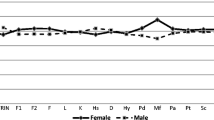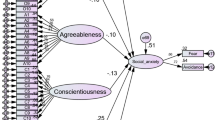Abstract
Marcia's operationalization of Erikson's identity construct, the four identity statuses, was used in a study on late adolescent males in an African cultural context. Identity statuses were determined for 110 first-year university students in relation to global identity, as well as occupation, religion and politics, the content areas of Marcia's original Identity Status Interview. Personality dimensions were measured by the High School Personality Questionnaire and the IPAT Anxiety Scale. Contrary to findings obtained in Western settings, adolescents in the foreclosure status (global identity) displayed lower intelligence and concrete thinking patterns. Identity statuses relating to the individual content areas were both supportive and in conflict with findings obtained in Western studies, indicating possibly qualitative differences in an African situation.
Similar content being viewed by others
References
Alberts, C. (1990, October). Identity formation of black university students: An empirical investigation. Paper presented at the 8th National Congress of the Psychological Association South Africa, University of Port Elizabeth.
Bosma, H.A. (1986). Identiteitsontwikkeling in de adolescentie. Nederlands Tijdschrift voor de Psychologie 41, 268-274.
Bourne, E. (1978a). The state of research on ego identity: A review and appraisal. Part I. Journal of Youth and Adolescence 7(3), 223-251.
Bourne, E. (1978b). The state of research on ego identity: A review and appraisal. Part II. Journal of Youth and Adolescence 7, 371-392.
Cattell, R.B., Eber, H.W. & Tatsuoka, M.M. (1970). Handbook for the Sixteen Personality Factor Questionnaire. Champaign, Illinois: Institute for Personality and Ability Testing.
Cattell, R.B., Scheier, I.H. & Madge, E.M. (1989). Manual for the IPAT Anxiety Scale Questionnaire. Pretoria: Human Sciences Research Council.
Donovan, J.M. (1975). Identity status and interpersonal style. Journal of Youth and Adolescence 4(1), 37-55.
Erikson, E.H. (1963). Childhood and society. New York: W.W. Norton.
Erikson, E.H. (1964). Insight and responsibility. New York: W.W. Norton.
Erikson, E.H. (1968). Identity: youth and crisis. New York: W.W. Norton.
Hickson, J. & White, E. (1989). Career maturity development in black South African adolescents: Implications for vocational counselling. South African Journal of Education 9(1), 77-81.
Kroger, J. (1989). Identity in adolescence. London: Routledge.
Marcia, J.E. (1964). Determination and construct validation of ego identity status. Unpublished doctoral dissertation. Ohio State University.
Marcia, J.E. (1966). Development and validation of ego identity status. Journal of Personality and Social Psychology 3(5), 551-558.
Marcia, J.E. (1967). Ego identity status: Relationship to change in self-esteem, “general maladjustment”, and authoritarianism. Journal of Personality 35, 118-133.
Marcia, J.E. (1980). Identity in adolescence. In J. Adelson (Ed.), Handbook of Adolescent Psychology (pp. 159-187). New York: Wiley.
Marcia, J.E. (1982). Identiteitstatus in de late adolescentie: Beschrijving en enkele clinische implicaties. In H.A. Bosma & T.L.G. Graafsma (Eds.), De ontwikkeling van identiteit in de adolescentie (pp. 50-64). Nijmegen: Dekker & Van de Vegt.
Marcia, J.E. (1995, November). The importance of conflict for adolescent and lifespan development. Paper presented at international Conference on Conflict and Development in Adolescence, Ghent, Belgium.
Marcia, J.E., & Friedman, M.L. (1970). Ego identity status in college women. Journal of Personality 38(2), 249-263.
Marcia, J.E., Waterman, A.S., Matteson, D.R., Archer, S.L. & Orlofsky (1993). Ego Identity: a handbook for psychosocial research. New York: Springer-Verlag.
Orlofsky, J.L., Marcia, J.E., & Lesser, I.M. (1973). Ego identity status and the intimacy versus isolation crisis of young adulthood. Journal of Personality and Social Psychology 27, 211-219.
Oshman, H., & Manosevitz, M. (1974). The impact of the identity crisis on the adjustment of late adolescent males. Journal of Youth and Adolescence 3, 207-216.
Podd, M.H. (1972). Ego identity status and morality: The relationship between two developmental constructs. Developmental Psychology 6(3), 497-507.
Podd, M.H., Marcia, J.E. & Rubin, B.M. (1970). The effects of ego identity and partner perception on a prisoner's dilemma game. Journal of Social Psychology 82, 117-126.
Rall, W.J. (1984). A comparison of married and living together couples. Unpublished master's thesis, University of South Africa.
Van Dijk, A. (1982). Manual for the Junior-Senior High School Personality Questionnaire. Pretoria: Human Sciences Research Council.
Waterman, C.K. & Waterman, A.S. (1974). Ego identity status and decision styles. Journal of Youth and Adolescence 3(1), 1-6.
Author information
Authors and Affiliations
Rights and permissions
About this article
Cite this article
Alberts, C., Meyer, J.C. The relationship between Marcia's ego identity statuses and selected personality variables in an African context. International Journal for the Advancement of Counselling 20, 277–288 (1998). https://doi.org/10.1023/A:1005373108406
Issue Date:
DOI: https://doi.org/10.1023/A:1005373108406




